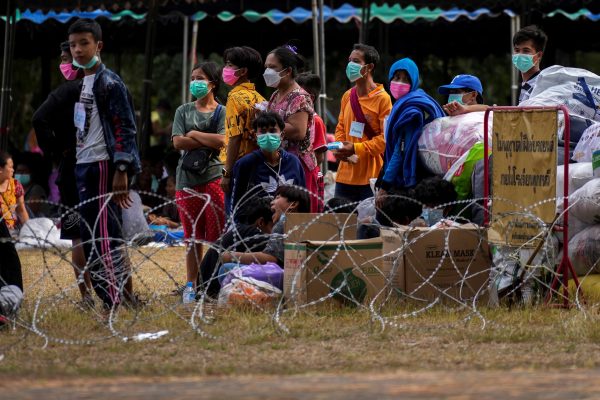State Counsellor Aung San Suu Kyi and President Win Myint, among many others, were arrested and charged with diverse, manufactured crimes. The Tatmadaw established the military State Administration Council, promising a return to representative rule a year after its ‘caretaker government’ (later amended to two years).
Military ‘resurgence’ implies a previous period of quiet, but the Tatmadaw has influenced and mostly ruled since independence. However unpopular, the Tatmadaw kept its iron grip over society for half a century through armed power, invented political parties, controlled access and avenues of mobility, and a self-written legal mask of constitutions. It settled for partial control for the remainder.
The first coup in 1958 was intentionally transitory, while the second in 1962 was for perpetual control. The third coup in 1988 brought an end to what had become a failed people’s revolution.
This present coup incited a revolution, the outcome of which remains in doubt. But with the military’s effective control over its ‘interests’, the coup seemed unnecessary. The Tatmadaw’s humiliating election defeat that denied the presidency to its aspirant — coup leader and Senior General Min Aung Hlaing — may be responsible.
Extreme violence erupted throughout the state. All elements refused to return to the status quo ante and protracted fighting continues in the form of sporadic urban insurrection and protracted rural warfare. Further chaos, economic stagnation and national decay seem inevitable.
The military suppression of dissent has resulted in at least 1300 civilian deaths, hundreds of Tatmadaw killed, government officials assassinated, innumerable civilians internally displaced and over 10,300 imprisoned. Civilians formed a National Unity Government, unrecognised but lobbying actively in the West, and on 7 September declared a state of war between it and the Tatmadaw. The military designated the group a terrorist organisation. Fighting has been especially pronounced in the largely Christian Chin State on the Indian Border and in the Kayah and Karen States on Thailand’s frontier.
On 6 December 2021, Aung San Suu Kyi and Win Myint were sentenced to four years in jail. While the charge was immediately mitigated to two years, they are facing further trumped-up charges which will yield guilty verdicts and prolonged sentences.
The devastation of violence was intensified by the spread of COVID-19. As of mid-December over 19,000 are reported to have died of COVID-19, though the figure seems grossly understated — this is a state with markedly inadequate and underfunded health services. Some private foreign investment pulled out and factories closed as overseas markets disintegrated. The World Bank estimates that the economy will decline by 18 per cent while per capita income is dropping.
Western nations have strongly and negatively reacted to the coup, with the United States imposing targeted sanctions. Formal recognition of Myanmar still rests with the National League for Democracy (NLD) and the United Nations has not agreed to replace the Myanmar ambassador with one that is junta-appointed.
Asian regional states and institutions have been more cautious and are unlikely to impose sanctions. China had good state relations with the NLD but it does not want its infrastructure projects negatively affected. Japan and South Korea may modify their assistance programs, but their major economic presences will continue.
ASEAN took the unprecedented step of not inviting Min Aung Hlaing to its summit meeting in August 2021. It attempted to negotiate a five-point agreement for an ASEAN delegate visit and dialogue, but it was evident that the Tatmadaw would not allow the necessary access. The region seems prepared to deal with whatever group remains in control. Russia now appears to be the Tatmadaw’s preferred partner. At an international security conference in Moscow in June, Min Aung Hlaing said ‘thanks to Russia, our army has become one of the strongest in the region’.
The future of Myanmar is in question. Even if, as promised, the Tatmadaw returns the state to some semblance of representative governance by August 2023, democracy will be lacking. Its intent seems to be to eliminate the NLD and ensure that Aung San Suu Kyi has no power. But this will come at a great cost to the Tatmadaw.
The present situation approaches civil war. Interethnic relations, always fragile, have deteriorated. Autonomous civil disobedience militias and groups are engaged in lethal struggles with a military that, despite lower-level defections, remains dominant, cohesive and loyal. COVID-19 rampages. The Rohingya crisis is ignored. Civil–military relations remain bitter. Compromise is anathema to all parties.
The experience of more access, rights and open inquiry during the previous decade of both military and civilian-military administrations likely means that the youth will not accept the Tatmadaw. These pressures may eventually split the Tatmadaw, which could increase the disorder. Poverty will deepen. Regional governments will deal with the new administration, but the ability of sympathetic foreign states to mitigate the disaster is limited. Myanmar is in military-instituted chaos.
David I Steinberg is Distinguished Professor Emeritus of Asian Studies at Georgetown University.
This article is part of an EAF special feature series on 2021 in review and the year ahead.


What is the point of elections? The junta plan to hold another election later next year, and if the result is the same as the last one and they will suffer a heavy defeat and are they going to walk away? I dont think so. The politicians who recognise the junta and collaborate with them must not value the word democracy. It is a word that is used for a purpose in a given situation, but ignored whenever it suits.